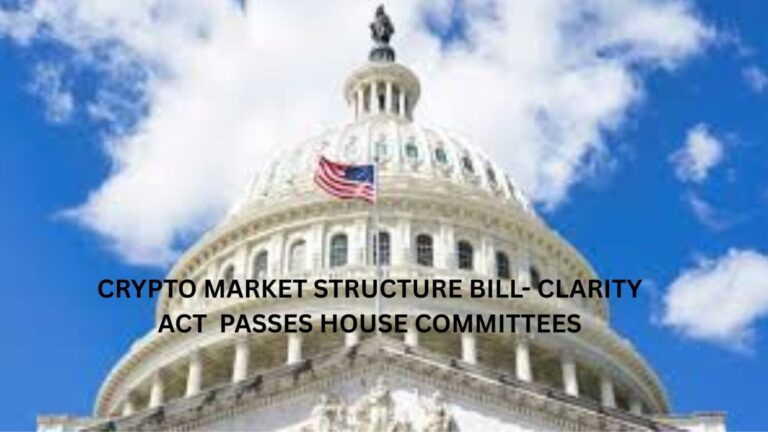Key Takeaways
- Beneath the act, the CFTC would change into the lead regulator for many digital belongings, with issuers retaining the choice to register with the SEC in the event that they plan to focus on institutional buyers immediately.
- A brand new modification states that sure non-controlling blockchain builders and repair suppliers is not going to be categorized as cash transmitters, sparing them from in depth registration necessities.
In a landmark improvement for the U.S. crypto business, the Digital Asset Market Readability Act—often known as the CLARITY Act—has efficiently handed by means of two essential House committees and can now advance to the complete House of Representatives for consideration.
The invoice, formally designated H.R. 3633, obtained a 32–19 bipartisan vote in favour throughout Wednesday’s House Monetary Companies Committee session. Sooner or later earlier, the House Agriculture Committee had additionally handed the laws by a decisive 47–6 margin, marking a uncommon second of cross-party consensus on crypto regulation in a divided Congress.
Championed by House Monetary Companies Committee Chairman French Hill (R-AR), the laws goals to determine a transparent federal regulatory framework for cryptocurrencies, separating tasks between the Securities and Change Fee (SEC) and the Commodity Futures Buying and selling Fee (CFTC). Beneath the act, the CFTC would change into the lead regulator for many digital belongings, with issuers retaining the choice to register with the SEC in the event that they plan to focus on institutional buyers immediately.
“This invoice is about establishing a good, useful, forward-looking regulatory framework that captures everybody collaborating in it,” mentioned Hill following the committee vote. “Congress has a historic alternative to offer the clear regulatory framework wanted to unlock this innovation.”
In an announcement, House Agriculture Committee Chairman GT Thompson (R-PA) added, “At the moment’s bipartisan votes advancing this invoice out of our respective committees proves that the timing is ripe to advance widespread sense laws that can lastly convey certainty to the digital asset house.”
Notably, the laws additionally accommodates specific protections for customers’ rights to carry digital belongings in non-custodial wallets and transact by way of peer-to-peer platforms. A newly added modification launched by Hill additional clarifies that sure non-controlling blockchain builders and repair suppliers is not going to be categorized as cash transmitters, sparing them from in depth registration necessities.
Bryan Steil (R-WI), chair of the Monetary Companies Subcommittee on Digital Property, performed a key function in ushering the invoice by means of each committees. Hill acknowledged Steil’s management, stating, “That is the second invoice that Bryan Steil has ably led—first stablecoins and now a market structure invoice.”
The laws did face resistance from a number of Democratic lawmakers in the course of the Monetary Companies markup session. Issues had been raised about potential regulatory loopholes, fears of enabling DeFi-related abuse, and broader criticism linked to perceived ties between digital asset lobbying and figures like former President Donald Trump. Rep. Sam Liccardo (D-CA) voiced reservations concerning the invoice’s capacity to forestall firms from exploiting decentralized classification to evade oversight.
Regardless of the partisan debate, assist from each Republican and choose Democratic members has pushed the laws one step nearer to changing into regulation.
Earlier than it might probably change into regulation, the consolidated version of the CLARITY Act should move a full House flooring vote and be reconciled with any Senate counterpart earlier than touchdown on the President’s desk.
The legislative momentum additionally coincides with the Senate’s upcoming vote on the GENIUS Act, a invoice addressing stablecoin regulation within the nation




